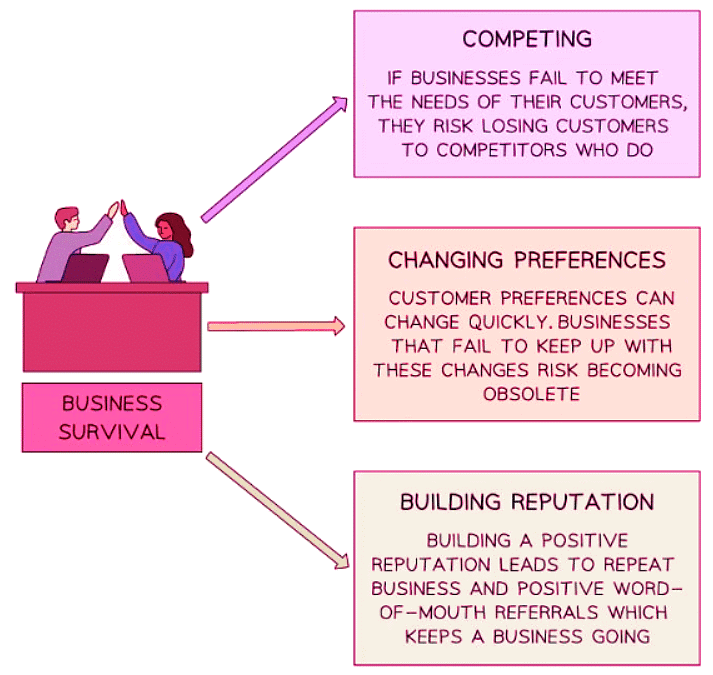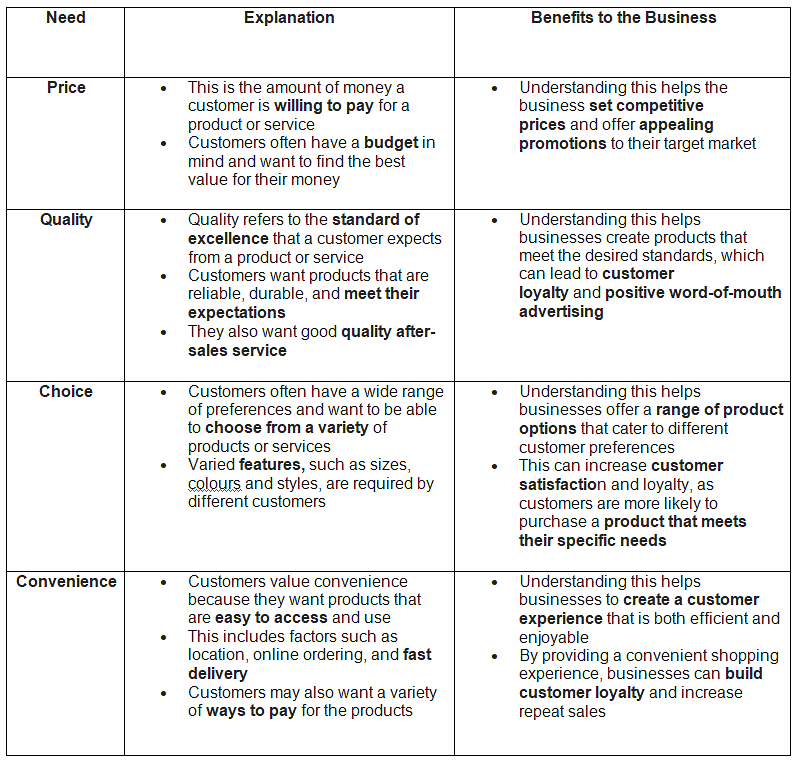Class 10 Exam > Class 10 Notes > Business Studies for GCSE/IGCSE > The Role of Marketing
The Role of Marketing | Business Studies for GCSE/IGCSE - Class 10 PDF Download
Identifying & Satisfying Customer Needs
- Marketing assists companies in recognizing and meeting the demands and desires of their customers. This involves:
- Understanding the variety and quality of products and services preferred by customers.
- Determining the prices customers are willing to pay.
- Implementing promotional strategies that encourage repeat purchases.
- Considering convenience factors such as preferred purchase locations and methods.
- Providing anticipated after-sales services.
- Meeting customer needs entails:
- Ensuring product availability at preferred purchase locations and times.
- Offering products at appropriate prices.
- Maintaining expected quality standards.
- Providing effective customer service.
The Benefits of Identifying Customer Needs

- Businesses that effectively identify and meet customer needs will:
- Compete more effectively than rival businesses
- Stay abreast of changing tastes and preferences
- Attract positive word-of-mouth recommendations and enhance the brand
The Benefits of Meeting Customers Needs

Customer Loyalty & Relationships
- Customer loyalty is when existing customers repeatedly purchase products from the same business.
Importance of Customer Loyalty
- Customer loyalty results in repeat purchases and an increase in market share.
- It is more cost-effective for a business to retain current customers, such as through loyalty programs, than to acquire new ones, which can be expensive.
Benefits of Customer Loyalty
- Enhances customer retention and fosters long-term relationships.
- Boosts profitability through increased sales and reduced marketing costs.
- Encourages positive word-of-mouth marketing and brand advocacy.
Building Customer Relationships
- Building customer relationships involves engaging with customers to foster loyalty towards the business and its offerings.
- Developing close connections with customers is essential for nurturing good relationships.
- Regularly assessing if products/services align with customer needs and preferences is crucial.
- For instance, conducting surveys to understand changing preferences.
- Utilizing technology to collect vital customer information.
- Regularly assessing if products/services align with customer needs and preferences is crucial.
- By maintaining strong ties with customers, businesses can effectively adapt to evolving customer expectations.
- Ensuring appropriate responses when customers alter their expectations of products or services.
Fostering Customer Loyalty
- Encouraging consistent communication to build strong customer bonds.
- Offering personalized experiences to enhance customer satisfaction.
- Providing tailored solutions that cater to individual customer needs.
- Delivering exceptional customer service to reinforce loyalty.
Question for The Role of MarketingTry yourself: What does identifying and meeting customer needs involve?View Solution
The document The Role of Marketing | Business Studies for GCSE/IGCSE - Class 10 is a part of the Class 10 Course Business Studies for GCSE/IGCSE.
All you need of Class 10 at this link: Class 10
|
70 videos|93 docs|26 tests
|
FAQs on The Role of Marketing - Business Studies for GCSE/IGCSE - Class 10
| 1. What are some strategies to identify and satisfy customer needs effectively? |  |
Ans. Some strategies to identify and satisfy customer needs include conducting market research, collecting customer feedback, offering personalized solutions, providing excellent customer service, and continuously improving products or services based on customer insights.
| 2. How can businesses build customer loyalty and relationships through marketing efforts? |  |
Ans. Businesses can build customer loyalty and relationships through marketing efforts by creating personalized experiences, engaging with customers on social media, offering loyalty programs, providing excellent customer service, and consistently delivering value to customers.
| 3. Why is understanding customer needs important for businesses? |  |
Ans. Understanding customer needs is important for businesses because it allows them to tailor their products or services to meet customer expectations, build strong relationships with customers, increase customer satisfaction and loyalty, and ultimately drive business growth and success.
| 4. How can businesses use customer feedback to improve their products and services? |  |
Ans. Businesses can use customer feedback to improve their products and services by actively listening to customer suggestions and criticisms, implementing changes based on feedback, conducting surveys and focus groups, and monitoring customer reviews and ratings to identify areas for improvement.
| 5. What role does customer loyalty play in the long-term success of a business? |  |
Ans. Customer loyalty plays a crucial role in the long-term success of a business as loyal customers are more likely to make repeat purchases, recommend the business to others, provide valuable feedback, and contribute to the business's overall profitability and growth.
Related Searches




















